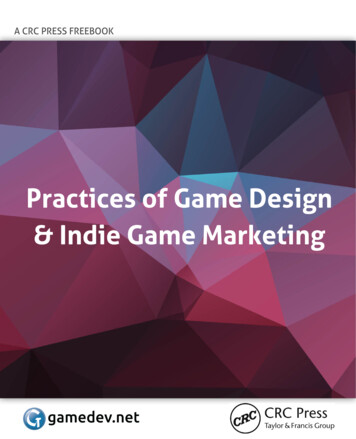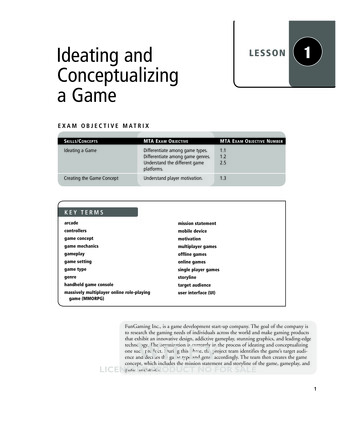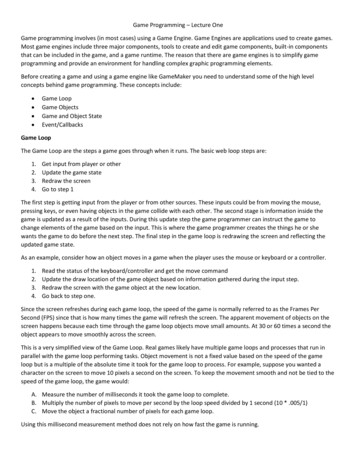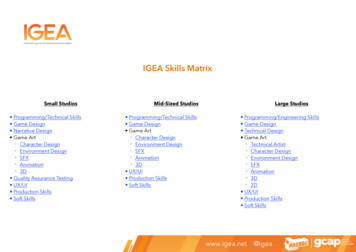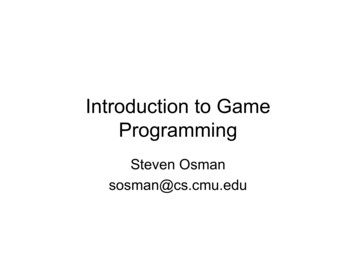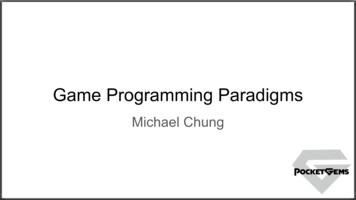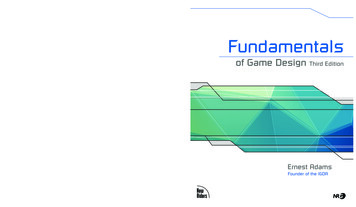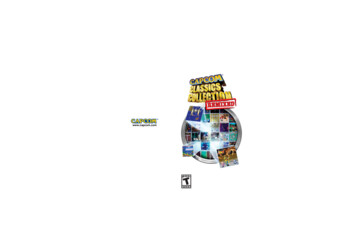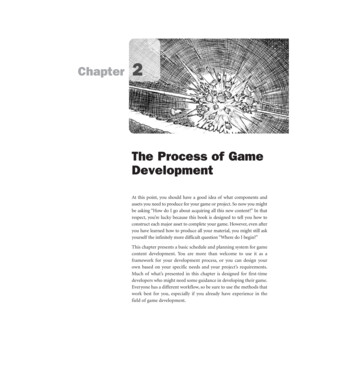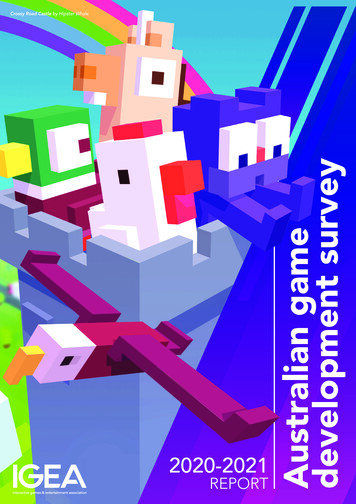
Transcription
Australian gamedevelopment surveyCrossy Road Castle by Hipster Whale2020-2021REPORT
Staff at WargamingFOR E W O RDThe Australian Game Development Survey 2021 is the 5th annual snapshot report IGEA has undertaken to measurethe size of the Australian game development industry. With the global video games market growing at a significantrate ( AU240 billion in 2020), it is no secret that Australians love to play games and love to create games. The lastfinancial year has resulted in pleasing growth and expansion for Australia’s highly creative and technically literategame development industry.IGEA’s snapshot report reveals an increase in 23% of revenue generated by Australian game development studiosover the previous year, alongside employment growth of 7%. Further, our survey revealed that the Australianindustry expects further growth into the foreseeable future.2021 has been a watershed moment for game development in Australia. On 6 May, the Federal Governmentannounced a very generous 30% Digital Games Tax Offset (DGTO) as part of their Digital Economy Strategy. TheDGTO is aimed directly at encouraging investment and employment in game development as a mechanism toboost the Australian economy.The confidence the DGTO announcement has injected into the industry has already impacted State Governmentssuch as NSW and QLD committing to additional PDV rebates for game development in their jurisdictions (10%and 15% respectively). Many multinational studios and investors are also ramping up their current activity level oractively exploring to establish a studio base here in Australia.We’ve seen successful IPOs for companies such as Mighty Kingdom and PlaySide Studios, alongside increasedmerger and acquisition activity involving studios like Big Ant and Blowfish Studios. We’ve witnessed the releaseof many critically acclaimed and successful Australian made games, including Unpacking, The Oregon Trail, ProjectWingman, The Artful Escape, The Forgotten City and Webbed, all of which firmly cement Australia’s reputation as acreative, commercially savvy and highly experienced community of game developers.The effects of all of these activities within the local game development sector have already had a positive impacton industry results. Making video games in Australia will be a crucial pillar of a modern, digital and creative countrythat will expand digital skills that can be applied and transferred across the economy. The introduction of Federaland State government incentives will ensure Australia captures a more significant piece of the growing globalentertainment games juggernaut and provide a complete and sustainable game development ecosystem for thebenefit of all Australians.Ron CurryCEO, IGEA1
INCOME GENERATED BYAUSTRALIAN GAME DEVELOPMENTSTUDIOS IN 2020/21 226.5M 23%AN INCREASE OFNUMBER OF FULL TIME EMPLOYEES* INAUSTRALIAN GAME DEVELOPMENT STUDIOS64%OVERLAST YEARHIRES400 NEWESTIMATED AT OVERFull timeemployee* location17%4% WA7%AN INCREASE OFOF STUDIOS ARE PLANNING TOHIRE NEW STAFF IN 2021/2022Studio locationBASED IN132710%*includes full time employees and contractors.2%WABASED INQLDBASED IN18%BASED INQLD13%BASED INNSW10%SA44% VICBASED INBASED INBASED INNSW4%BASED INACT4% TASBASED IN14%BASED INSA35%WORKING REMOTELY IN THEHighly skilledemployees9%DESIGNERS3%OTHER2%AUDIOOVERLAST YEARSAME STATE23%ARTISTS57% VICBASED IN23%2%2%BASED INACTBASED INTASWORKING REMOTELY FROMINTERSTATE34% PROGRAMMERS/ENGINEERS14%MANAGEMENT,ADMIN ANDMARKETING7% PRODUCERS6%QA2%WRITERS2
IP importanceGender diversity67%23%10%74%OF FULL TIME EMPLOYEES* ARE (CISGENDER) MALEOF FULL TIME EMPLOYEES*ARE (CISGENDER) FEMALEOF RESPONDENTS DEVELOPTHEIR OWN IPOF FULL TIME EMPLOYEES* ARE TRANSGENDER,NON-BINARY OR GENDER DIVERSEExport focused82%*includes full time employees and contractors.Studio stage45% 5 YEARS OLD34% 6-10 YEARS OLD21% 10 YEARS OLDOF STUDIOS AREOR LESSOF STUDIOS AREOF STUDIOS AREOR MOREDeveloping gamesfor many platforms62%46%35%17%7%5%1%PC/MACMOBILE (inc. TABLET)CONSOLE (inc. HANDHELD)VIRTUAL REALITY (VR)WEB BASEDAUGMENTED REALITY (AR)OTHER (e.g. MERCHANDISE)OF INCOME GENERATEDIS FROM OVERSEAS MARKETSAND INVESTMENTChallenges facingthe industry123HIRING EMPLOYEESWITH SPECIALISED SKILLSATTRACTING EARLY-STAGEDEVELOPMENT FUNDINGLACK OF APPROPRIATEGOVERNMENT FUNDINGCOVID-19 impacts89%OF STUDIOS EXPECT REVENUE TOREMAIN STABLE OR INCREASE77%OF STUDIOS ARE NOT MAKINGSTAFF REDUNDANCIES70%OF STUDIOS ARE CONFIDENT OF NOTCLOSING IN THE FORESEEABLE FUTURE3
Key FiguresFY2021FY2020FY2019FY2017FY2016No. of companies1879714311463Revenue (Million) 226.5 184.6 143.5 118.5 114.86Revenue per employee (Million) 0.17 0.15 0.11 0.13 0.14No. of 302212268167156Gender diverse *147371293Please see FAQ and note that in the FY2021 survey, Gender Diverse as a category in the table above includestransgender male, transgender female and non-binary people. It has been categorised this way to ensureconsistency on how we have measured that data in previous surveys.Revenue 240M 180M 120M 60MFY2016FY2017FY2019FY2020 FY2021Australia has seen a steady increase in revenue earned by game development studios over the period of thesesurveys. Our data highlights that between FY2016 and the current year, revenue has almost doubled for the localindustry – increasing 97%. The last three years have seen year on year growth of over 20%, with Australian studioscapitalising on the increasing global popularity of playing video games.4
EmploymentNo. Of Employees14001050700350FY2016FY2017FY2019FY2020 FY2021The Australian game development industry has enjoyed an increase in full-time employment (58%) since thecommencement of the survey.Studio LocationGame development studios are scattered throughout Australia, with the majority headquartered in capital cities.Victoria remains home to the most significant number of studios and houses the most full-time employees acrossAustralia. This is reflective of major international studios such as EA Firemonkeys and Sledgehammer Games residingin Melbourne. Further to that, consistent state government support has seen a large and thriving independent studiobase remain in Victoria.While South Australia has fewer studios than New South Wales and Queensland, it is home to more full-timeemployees per capita, which reflects the South Australian government’s 10% PDV rebate incentive to gamedevelopment studios that have been in place since 2020. The impact of recent offset announcements by New SouthWales and Queensland will take time to show results.StateStudio LocationFull Time UTH AUSTRALIA10%14%ACT4%2%WESTERN AUSTRALIA4%2%TASMANIA4%2%5
Gender DiversityFY2021 has seen a jump in the number of women and gender diverse people working in Australian gamedevelopment studios. 67% are (cisgender) male, 23% are (cisgender) female, 8% are transgender and 2% ofemployees are non-binary. In our previous industry snapshot, 80% of employees were male. It would seem thatAustralian studios are actively recruiting diverse employees and the attraction programs they are implementing arebeginning to have an impact.The trends in diversity are summarised in the graph below:MenNo. Of Employees1000WomenGender hallenges Facing Australian Game DevelopersThe top 3 challenges facing Australian game developers in 2020/21 are#1Hiring employees with specialised skills#3Lack of appropriate government funding#2Attracting early-stage development fundingThis is the first time industry has identified ‘hiring employees with specialised skills’ as the biggest challenge facingthe local industry. The global demand for experienced staff, along with closed borders and unfavourable migrationprograms, is impacting the local sector. This lack of specialised talent was exacerbated when many Australian gamedevelopers moved overseas for employment post the GFC and have yet to return.With increased funding available to the industry as of 2022, coupled with the inclusion of game development inskilled migration programs, we hope to see experienced game developers enter and/or return to Australia over thenext 12 months.6
COVID-19 ImpactsThe global pandemic has had a somewhat positive impact on the game development sector. The majority ofemployees have been able to work from home, proving the industry is very adaptable and nimble. Many localstudios remain optimistic for the near future.89% of studios expect revenue to remain stable or increase77% of studios are not making staff redundancies70% of studios are confident of remaining open in the foreseeable futureIt should be noted that positive experiences are not the same across all studios. Many businesses noted that theinability to travel and meet new and potential partners/investors are impacting their progress, along with a reductionin productivity due to hybrid work models.SummaryThe 2021 Australian Game Development Survey Snapshot highlights an expanding local industry well positionedto take advantage of the global growth in playing games. Over the last 12 months, IGEA has been delighted tosee recognition and support from government at all levels that has been targeted towards the game developmentindustry. With the bulk of these programs commencing in the coming financial year, there is an expectation thatgames will drive further growth in employment and revenue for all Australians. Australia will likely see increasedinvestment from the private sector, with larger game development studios and adjacent companies establishing abase in Australia.The future is indeed bright for the highly creative, highly skilledvideo games development industry in Australia.Staff at Blowfish7
FAQWhen was the survey undertaken?Our 2020-2021 game development survey is based on financial year data from 1 July 2020 – 30 June 2021. Thesurvey opened in September 2021 and closed at the end of November 2021. Bond University have managed thedata collection and analysis on behalf of IGEA.What are the requirements from studios to complete the survey?We ask that respondents have an ABN and have made or are making games.Aren’t there more game development studios in Australia?Over 400 Australian development studios were contacted multiple times and requested to complete our annualgame development survey.Participation is voluntary, with 187 studios completing the survey and providing usable data.Who completed the survey?We are unable to identify the Australian game development studios that completed the 2021 survey. Under ouragreement, Bond University conducted the research on IGEA’s behalf. To preserve the integrity of the data, BondUniversity then provided IGEA with aggregated data from the survey without identifiers. Bond University is notpermitted to provide the data to any other party.State based statisticsIGEA has no control over who completes the questionnaire. This data simply captures those companies thatcompleted the survey at a point in time. 2021 saw greater participation in the survey from states such as Tasmaniaand Western Australia.Gender based statisticsAfter consultation with the local transgender community, we revised the way we asked this particular questionspecifically:As at 30 June 2021, what was the gender breakdown (how many) by FTE?Female (cisgender)Female (transgender)Male (cisgender)Male (transgender)Non-BinaryIn previous surveys, we had not included ‘cisgender’ in either the male or female category. Studios answer thisquestion to the best of their ability within legal and privacy regulations.8
IGEA (Interactive Games & Entertainment Association) is the peak industryassociation representing the voice of Australian and New Zealand companies in thecomputer and video games industry. IGEA supports the business and public policyinterests of the games industry, through advocacy, research and education programs.We work with many stakeholders including all levels of government, agencies, mediaand other trade associations.IGEA advocates on behalf of our members, who range from one-person studiostartups to larger multinational developers, publishers, platform holders and digitalstorefronts. IGEA’s role is to help our members and the wider industry moreeffectively create, distribute and sell interactive games, entertainment content andrelated hardware.Through the provision of consistent and frequent industry research and data, alongwith communications programs, IGEA promotes the interactive games industry bothlocally and abroad. Please visit www.igea.net for further information.Follow us/igea.net@igea@GCAPConf@TheArcadeMelbInteractive Games & Entertainment Association (IGEA)
Game development studios are scattered throughout Australia, with the majority headquartered in capital cities. Victoria remains home to the most significant number of studios and houses the most full-time employees across Australia. This is reflective of major international studi

